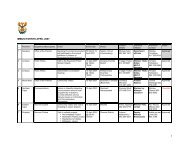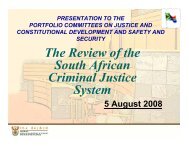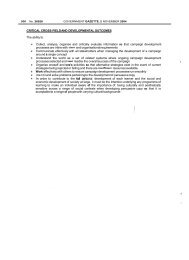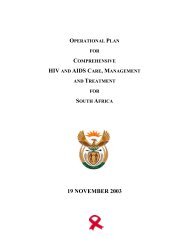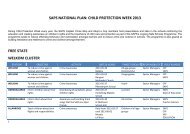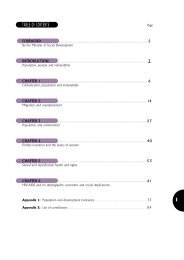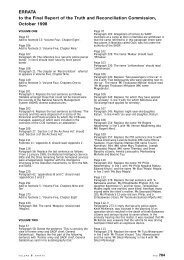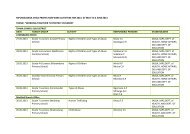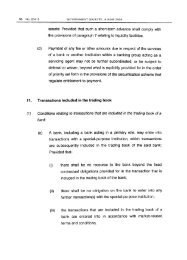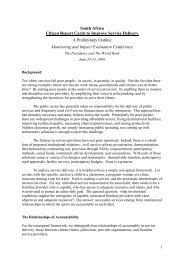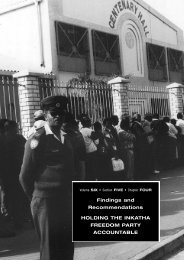Chapter 36
Chapter 36
Chapter 36
Create successful ePaper yourself
Turn your PDF publications into a flip-book with our unique Google optimized e-Paper software.
CHAPTER <strong>36</strong><br />
PIETERMARITZBURG<br />
MANAGEMENT AREA<br />
259
CHAPTER <strong>36</strong><br />
PIETERMARITZBURG MANAGEMENT AREA<br />
CONTENTS<br />
Page<br />
1. Introduction 261<br />
2. Population 261<br />
3. Staffing 262<br />
4. Division between Managers 263<br />
5. Operation Quiet Storm 268<br />
5.1 Key Role Players 271<br />
5.1.1 Mr Russell Ngubo 271<br />
5.1.2 Mr Thamsanqa Obedient Memela 276<br />
5.1.3 Mr Nhlanhla Charles Ndumo 277<br />
5.2 Mrs Thandiwe Kgotsidintsi 278<br />
6. Intimidation 282<br />
7. Discipline 283<br />
8. Recruitment 284<br />
9. Promotions and Merits 284<br />
10. The Prison Hospital 285<br />
11. Prisoners’ Assaulted by Warders 287<br />
260
CHAPTER <strong>36</strong><br />
PIETERMARITZBURG MANAGEMENT AREA<br />
1. INTRODUCTION<br />
The Pietermaritzburg Management Area consists of two (2) prisons, Medium<br />
A and Medium B. Medium A is sometimes referred to by witnesses as the<br />
“New Prison”.<br />
The Female Prison, Medium B, is a building on its own. It is about three (3)<br />
kilometres away from the Main Prison (New Prison). The Female Prison<br />
receives its cooked meals from the Main Prison.<br />
2. POPULATION<br />
Evidence put before the Commission showed that there were 2 984 prisoners<br />
at Pietermaritzburg Prison as at 19 March 2002. The approved<br />
accommodation for the prison is 1 399, which means the prison was<br />
overpopulated by 113%.<br />
According to the official records, the average population of the two prisons<br />
during March 2002 was:<br />
Medium A:<br />
Medium B:<br />
2 952 (224.96% full)<br />
53 (42,40% full)<br />
The records show that Medium A stood at an average of 230% during the<br />
period from February 2002 to June 2003, while Medium B was on average<br />
about 68% full during the same period, but on average 115% during the first<br />
three months of 2003. On 1 April 2002 there were four (4) babies in the<br />
Female Prison.<br />
261
The Commission heard evidence that unit management requires that only two<br />
(2) to three (3) inmates be held in a cell, but this is not achievable and in some<br />
cases five (5) to ten (10) prisoners are held in one (1) cell due to the<br />
unavailability of space. The communal cells designed to accommodate<br />
nineteen (19) prisoners sometimes hold fifty (50).<br />
3. STAFFING<br />
The staff complement of the Management Area is 1 <strong>36</strong>7 and is made up as<br />
follows:<br />
Pietermaritzburg Area Commissioner:<br />
Pietermaritzburg Medium A:<br />
Pietermaritzburg Medium B:<br />
933 (74 vacant)<br />
409 (16 vacant)<br />
25 (14 vacant)<br />
The Commission heard that there is a great shortage of personnel due to the<br />
fact that the prison was restructured so that the operation of the buildings<br />
could be carried out by “control panels’’. However, personnel to operate the<br />
panels have not been provided for. In addition, a significant number of<br />
personnel are used to guard prisoners outside the prison during court or<br />
hospital visits. It emerged during the hearings that the fully equipped prison<br />
hospital was not being used and this placed work pressure on the staff<br />
because inmates had to be escorted to provincial hospitals outside the prison<br />
premises.<br />
The office of the Provincial Commissioner of KwaZulu-Natal has been located<br />
within the precinct of the Pietermaritzburg Management Area since May/June<br />
1999 and the nearest police station that services the Pietermaritzburg<br />
Management Area is the Prestbury Police Station.<br />
There has been a high turnover of Provincial Commissioners for KwaZulu-<br />
Natal and this to some extent is an indication of the problem in the<br />
262
Management Area and the Province as a whole. In the circumstances it is<br />
appropriate to consider their terms of office, which are as follows:<br />
Name Term of Office Previous Place of<br />
Appointment<br />
Mr J. Hills 1994 – 31-03-1995 Head Office: Pretoria<br />
Mr P.A. Zandberg 1995-04-01 – 23-06-1995 Gauteng<br />
Mr J.W. Harding 26-06-1995 – 31-03-1997 Durban<br />
Mr M.T. Ntoni 01-04-1997 – 28-02-1999 Director: Regional Office<br />
KZN<br />
Mr S.E. Korabie 01-03-1999 – 30-04-1999 Head Office: Pretoria<br />
Mrs.T.S.<br />
01-01-1999 – 30-04-1999 Head Office: Pretoria<br />
Kgosidintsi<br />
Mr G .J. Fourie 01-06-1999 – 30-07-1999 Head Office: Pretoria<br />
Mr C.T. Jordaan 10-08-1999 – 30-06-2000 Head Office: Pretoria<br />
Mr P.<br />
01-08-2000 – 30-10-2003 Head Office: Pretoria<br />
O’C Gillingham<br />
Mr F. Engelbrecht 01-11-2003 – 31-01-2004 DCS – KZN<br />
(Acting)<br />
Mr V.P. Petersen 01-02-2004 – present External appointment<br />
4. DIVISION BETWEEN MANAGERS<br />
Evidence shows that management at Pietermaritzburg was gravely divided<br />
into two (2) camps, to the extent that one group of managers sought to<br />
undermine the other group. The situation was further exacerbated by the fact<br />
that a key role player, Mr Russell Ngubo, was feared by almost all the<br />
managers except for the few who formed part of his clique. 1 Mr Ngubo was a<br />
senior member of Popcru and of the Pietermaritzburg Prison management. In<br />
1<br />
At the time of writing Mr Ngubo was imprisoned and sentenced on charges of<br />
murdering Inkatha Freedom Party (IFP) leader Nash Protus Ngubane on 13<br />
September 1995. See Pietermaritzburg High Court case number CC 56/03.<br />
263
February 1998 he was Head of the Pietermaritzburg Prison 2 and at the time of<br />
the hearings he was Head of Human Resource Management. His clique was<br />
referred to by some witnesses as the ‘‘A Team’’. Its members, at the time of<br />
the hearings, included the Supervisor in the Personnel Office, Mr T.O.<br />
Memela; Head of Personnel Mr N.C. Ndumo; Section Head of Personnel Mr<br />
D.K. Mbanjwa; Ms Mlungisi Dlamini (Mr Ngubo’s fiancée at the time); the<br />
Section Head of the Institutional Committee Miss B. Mahaye, and others.<br />
Those in the ‘‘B Team’’ included the Deputy Chairperson of the Institutional<br />
Committee, Mr F.A. Mbanjwa; Assistant Head of Prison Mr V.J. Ndlovu;<br />
Assistant Head of the Institutional Committee Mr M.E. “Elvis” Nene; former<br />
Area Manager Miss F.G. Nkosi; Head of Security Mr N.S. “Snotty” Mkhize,<br />
and Pietermaritzburg Area Manager Mr D.J. Makhaye (who subsequently<br />
became the Area Manager in Kokstad).<br />
Other witnesses referred to the ‘‘A Team’’ and “B” Team as the Makhulu (‘‘Big<br />
One’’) and Mancane (‘‘Small One’’) camps, respectively. This reference was<br />
indicated that the ‘‘A Team’’ was the dominant, more powerful camp.<br />
Mr Alfred Mbanjwa describes the impact of the division in his affidavit to the<br />
Commission:<br />
“The people who are part of the A-group or who are deemed to be his<br />
[Mr Ngubo’s] followers have not done so voluntarily. They have been<br />
forced into that position because they recognise that if they do not<br />
dance to his particular tune they will get nowhere in the prison. A prime<br />
example of this is me. I have never received any promotions,<br />
increments or any advancements because of the fact that I am deemed<br />
to be his opposition. Mr Ngubo is known to make life very difficult for<br />
those people who do not ascribe to his particular ideology or who do<br />
not support him.” 3<br />
2<br />
3<br />
See Pietermaritzburg Exhibit ‘X’.<br />
As per Pietermaritzburg Exhibit ‘F’.<br />
264
This division within management was described as part of the reason for the<br />
animosity and conflict that existed between members of management. In<br />
addition, the Commission heard that it was the ‘‘B Team’’ that did the majority<br />
of the work required to run the prison. By the time the Commission held its<br />
hearings on Pietermaritzburg, a number of the members of the “A Team’’ had<br />
been arrested on a number of charges and were in custody awaiting trial.<br />
It was clear to the Commission that managing the Pietermaritzburg Prison is a<br />
difficult task. This is also reflected in the staff turnover. The current Head of<br />
Prison seems to be the one who has stayed the longest after 1994.<br />
The terms of office of the Heads of the Pietermaritzburg Prison are as follows:<br />
Name Term of Office Previous Place of<br />
Appointment<br />
Mr P.G. Roets 1994 – 31-03-1997 Barberton<br />
Mr C.P. van der Merwe 01-04-1997 – 31-05-1997 Pietermaritzburg Prison<br />
Mr D.S. Mthethwa 01-06-1997 – 31-01-1998 Pietermaritzburg Prison<br />
Mr B.R. Ngubo 01-02-1998 – 02-03-1999 Pietermaritzburg Prison<br />
Mr V.J. Ndlovu 03-03-1999 – 04-04-2002 Pietermaritzburg Prison<br />
Mr B.B. Mchunu 05-04-2000 – present Pietermaritzburg Prison<br />
According to the initial evidence, Mr Ngubo was appointed as Head of<br />
Pietermaritzburg Prison on 1 February 1998 after acting as Head of Prison in<br />
Newcastle. This information was supplied on 19 October 2004 by the<br />
Regional Commissioner, Mr J. C. Taljaard. 4<br />
However, according to the Department’s latest letter from the Regional Coordinator<br />
Human Resource Management and Support, Mr Mzileni, dated 8<br />
4<br />
See Pietermaritzburg Exhibit ‘X’.<br />
265
November 2005, Mr Ngubo was appointed as Head of Prison on 12 January<br />
1998. 5<br />
Mr Mzileni sent another letter dated 8 November 2005, in which he stated<br />
that:<br />
“According to the information available at the Personnel Section<br />
Mr Ngubo was appointed as Head of Pietermaritzburg<br />
Correctional Centre on 1999-07-01 to 2000-01-01.” 6 (Own<br />
emphasis).<br />
Therefore three (3) separate dates were submitted to the Commission as the<br />
date of his appointment, were submitted to the Commission. This once again<br />
reflects on the problem with managing information in the Department, which<br />
was referred to earlier in this report. 7<br />
The Terms of Office for the Area Managers are as follows :<br />
Name<br />
Term of Office<br />
1 Ms F.G. Nkosi August 1997 to June 1999<br />
2 Mr D. J. Makhaye July 1999 to June 2002<br />
3 Mr J.M. Mkhabela June 2002 to May 2003<br />
4 Mr J.E. Joseph January 2004 to February 2005<br />
5 Mr M.A. Mdletye May 2005 to date<br />
5<br />
6<br />
7<br />
See Pietermaritzburg Exhibit ‘X1’.<br />
See Pietermaritzburg Exhibit ‘X2’.<br />
See the section dealing with Information Management in <strong>Chapter</strong> One of this report.<br />
266
A report compiled by Brite Future Consultants, a team of psychologists, and<br />
presented to the Department of Correctional Services in October 1998,<br />
highlighted a number of problems relating to management issues, and<br />
particularly the division within management.<br />
It states that at the time there was a “high level of tension and dissatisfaction,<br />
frustration, anger and mistrust” at the prison, and that there was a general<br />
perception by members that management lack the essential leadership<br />
qualities required to steer the organisation in the right direction. Examples<br />
cited were:<br />
(a) Political allegiance is the major criterion for appointing personnel to<br />
management positions.<br />
(b) Management does not devolve power to allow people who carry out the<br />
day-to-day duties of the Department to have a say in decisions that<br />
they will have to carry out.<br />
(c) No training and development opportunities exist to acquaint staff with<br />
the rules and regulations of the Department.<br />
(d) Leadership fails to implement decisions.<br />
(e) Recruitment procedures and advertisements for posts apply only to<br />
people who are targeted for particular jobs.<br />
(f) Information is not widely disseminated and as a result members have<br />
to rely on hearsay.<br />
(g) Management and staff lack discipline.<br />
(h) A general breakdown of organisational norms and standards. 8<br />
Mrs Thandiwe Kgotsidintsi, who has held several senior positions within the<br />
Department, told the Commission that the then Provincial Commissioner, Mr<br />
Maxwell Ntoni, attributed many of the problems in the Department of<br />
Correctional Services in KwaZulu-Natal to a political division between<br />
members aligned to the Inkatha Freedom Party and others to the African<br />
National Congress. This allegation was made at a meeting with Mrs<br />
8<br />
See Pietermaritzburg hearings, Exhibit ‘A’ at pages 7 – 116.<br />
267
Kgotsidintsi and the then National Commissioner, Mr Khulekani Sithole, who<br />
raised a number of concerns with Mr Ntoni about the way Correctional<br />
Services in the province had been operating. 9 These included:<br />
(i)<br />
(ii)<br />
(iii)<br />
(iv)<br />
(v)<br />
(iv)<br />
(vii)<br />
The withdrawal by Mr Ntoni of a charge of firearm theft against Mr<br />
Ngubo.<br />
Allowing Mr N.C. Ndumo to use a Department of Correctional Services<br />
minibus to open an ANC branch rally. The vehicle was subsequently<br />
“hijacked”.<br />
Ncome Prison continuing to be unruly and ungovernable, with frequent<br />
escapes and the daily theft of prison cattle.<br />
The Area Manager of Westville Prison, Mr I.S. Zulu, being bailed out by<br />
Mr Ntoni after allegedly being caught by the police with a boot full of<br />
dagga.<br />
Mr Ngubo, Mr Ndumo and Mr Memela running Correctional Services in<br />
KwaZulu-Natal and causing chaos.<br />
Mr Ntoni allowing the media too much access to Mr P.M. Ntuli.<br />
Mr Ntoni’s defiance in several cases where Mr Sithole had instructed<br />
him to take specific actions.<br />
Mrs Kgotsidintsi said that the meeting ended abruptly because the National<br />
Commissioner and the Provincial Commissioner were so angry that they<br />
began to exchange blows. 10<br />
5. OPERATION QUIET STORM<br />
Operation Quiet Storm was a plan of action conceived by members of Popcru<br />
to forcibly transform and restructure the Department of Correctional Services.<br />
Sit-ins were organised and unwanted personnel were systematically targeted<br />
and hounded out of office either by intimidation or violence. In some cases the<br />
unwanted individuals were simply removed by force from their offices and<br />
never again allowed to enter the prison premises. Operation Quiet Storm was<br />
9<br />
10<br />
See Pietermaritzburg transcript Volume 13 page 1 169.<br />
See Pietermaritzburg Volume 13 at page 1 172.<br />
268
vigorously implemented in Pietermaritzburg, which is historically a stronghold<br />
of Popcru, and other KwaZulu-Natal prisons. 11 However, the Commission<br />
heard that it was the intention of Popcru to launch the plan in KwaZulu-Natal<br />
initially, and then roll it out nationally. 12<br />
Mr Philemon Mphikiseni Ntuli, the Provincial Liaison Officer in KwaZulu-Natal<br />
and an office bearer of Popcru, testified that the Department of Correctional<br />
Services in KwaZulu-Natal was effectively “hijacked” following a meeting at<br />
the Pietermaritzburg offices of Popcru. The meeting was attended by Popcru<br />
officials, paid up members and sympathisers from various regions around<br />
KwaZulu-Natal as well as a representative from the national office of<br />
Popcru. 13<br />
Discussions at the meeting were led by Mr Ngubo, Mr Nhlanhla Ndumo and<br />
Mr Nhlanhla Zondi 14 and a plan, which was code-named Operation Quiet<br />
Storm, was formulated. Mr Ntuli’s evidence is dealt with in more detail in the<br />
<strong>Chapter</strong> dealing with the Historical Background.<br />
Besides Mr Ntuli’s evidence the Commission received other affidavits, minutes<br />
of meetings and press cuttings that supported the evidence about Operation<br />
Quiet Storm. 15<br />
Popcru had embarked on Operation Quiet Storm to make sure that before the<br />
end of November 1996 they would successfully place members in strategic<br />
positions in six (6) prisons. 16<br />
11<br />
12<br />
13<br />
14<br />
15<br />
16<br />
See Historical Background and Trade Unionism <strong>Chapter</strong>s for more details.<br />
Evidence heard by the Commission pointed to Operation Quiet Storm being rolled out<br />
nationally, or at least in the Eastern Cape, Free State and Gauteng.<br />
Mr Mataka, who was then the Secretary General of Popcru, tried to deny that they<br />
attended such a meeting, for obvious reasons. For more details on the union’s role in<br />
this regard refer to the chapter on Historical Background.<br />
Messrs Ndumo and Ngubo appeared before the Commission and also tried to deny<br />
the existence of Operation Quiet Storm.<br />
For more details refer to <strong>Chapter</strong> on Historical Background.<br />
As per Pietermaritzburg Exhibit ‘WWWW8’.<br />
269
Several newspaper articles also support the evidence about Operation Quiet<br />
Storm. Mr Ntuli was quoted as Popcru’s provincial spokesman in the Natal<br />
Witness of 17 October 1996 as saying that the siege of the Ncome Prison by<br />
Popcru members was part of a provincial campaign to depose the prison<br />
commanders and transform the prisons. The article continues:<br />
“What started out as a gradual process of transforming the prison<br />
service early this year turned into a popular revolt by POPCRU. The<br />
union confirmed yesterday that prison commanders and their deputies<br />
at the Stanger, Empangeni, Sevontein, Westville and Ncome<br />
correctional facilities have been removed from their posts over the past<br />
month.<br />
Ntuli blamed the revolt on ‘the fact that nothing has been done to visibly<br />
change the present racial composition of management since the<br />
beginning of the transformation process.’<br />
‘We saw no other viable strategy to transform the prisons other than by<br />
force.<br />
‘We therefore opted to elect black staff into management positions to<br />
run the prisons,’ he said.” (Own emphasis)<br />
Evidence with regard to meetings held at Newcastle Prison and Port<br />
Shepstone Prison revealed that Mr Ngubo, Mr Ndumo and Mr J.B.T. Chaka 17<br />
were not hesitant to involve themselves in the affairs of other areas on behalf<br />
of the Department of Correctional Services.<br />
A senior correctional officer and the Deputy National Chairman of the Public<br />
Servants Association, Mr Zeblon Mthethwa, told the Commission that the<br />
three (3) men visited the Newcastle Prison on 11 September 1998 to discuss<br />
a complaint about a member who had been transferred from Ncome<br />
17<br />
Mr J.B.T. Chaka was in charge of Labour Relations in the Province and he is still<br />
employed as such.<br />
270
Management Area to Newcastle. The three (3) arrived in a minibus that had<br />
been hired by the Durban Management Area, but had been used the previous<br />
day during a visit by Popcru leadership to the Newcastle Prison.<br />
The Area Manager of the Port Shepstone Area, Mr Thandanani William<br />
Siswana, said that Mr Ngubo, Mr Ndumo and Mr Chaka visited him in Port<br />
Shepstone on 2 September 1998 to discuss the equity policy according to<br />
which seventy per cent (70%) of all posts had to be given to blacks while thirty<br />
per cent (30%) had to go to whites. There was also discussion about a Mrs<br />
Kruger, the wife of the former Head of the Prison, who worked for the<br />
Department of Correctional Services but was still staying in the house<br />
allocated to the Head of the Prison with her husband, who had taken a<br />
severance package. Mr Siswana said that he was unable to evict Mrs Kruger<br />
without finding alternative accommodation for her. However, he testified that<br />
he was told that he was just keeping her on because he is “afraid of whites”.<br />
Mr Siswana said that when the three men left he did not have as much control<br />
over his junior warders because he had been embarrassed in front of them.<br />
Whilst many Commanders, mnagers and senior officials, who were hounded<br />
out of their offices as a result of Operation Quiet Storm, did not testify before<br />
the Commission either because of fear or because they might have wanted to<br />
put their traumatic experiences behind them, the Commission is of the view<br />
that the experiences of Mrs Kgosidintsi and Mr E.P.Claasen, best illustrate<br />
the nature of the operation and the traumatic effect it had on its victims. 18<br />
5.1 Key Role Players<br />
5.1.1 Mr Russell Ngubo<br />
A senior official in the Department of Correctional Services in KwaZulu-Natal,<br />
Mr Russell Ngubo, has been one of the key role players in activities related to<br />
Correctional Services in the Pietermaritzburg area, and even further afield in<br />
18<br />
Ms Kgosinditsi and Mr Claasen’s evidence will be dealt with hereinafter.<br />
271
KwaZulu-Natal. The important role that he played in Operation Quiet Storm<br />
and in the powerful ‘‘A Team’’ of Correctional Services officials has already<br />
been mentioned.<br />
In October 1997, Mr Ngubo was appointed as Acting Commander at<br />
Newcastle Prison. According to documents in the Commission’s possession,<br />
Mr Ngubo immediately removed a number of non-Popcru members from their<br />
posts. 19<br />
During a significant portion of his time as a senior Correctional Services<br />
official, Mr Ngubo was also a local government councillor for the ANC in<br />
Impendle.<br />
Late in 1997 Mr Ngubo was appointed as the Head of Pietermaritzburg’s New<br />
Prison and by 2001 he had been appointed as Head of Human Resources at<br />
the Prison.<br />
Mr Ngubo has featured prominently in the media over the years. He was<br />
reported to have been out on bail for his alleged involvement in the murder in<br />
1996 of four members of a family at the time of his appointment as Head of<br />
the Pietermaritzburg Prison in January 1998. He was also linked to a shooting<br />
incident outside a Pietermaritzburg court in 1996 when seven (7) members of<br />
the IFP were on trial for the murder of Mr Ngubo’s brother and four (4)<br />
19<br />
Minutes of meeting between Mr T.D. Ntombela (Member of the KwaZulu-Natal<br />
Legislature), Mrs N.C. Mkhize and 21 prison warders at Newcastle Prison on 9<br />
January 1998. The minutes also state that from 10 October 1997, Mr Ngubo used a<br />
state vehicle despite the fact that he has no driver’s licence. “He travelled between<br />
Newcastle and Pietermaritzburg on a daily basis. A state vehicle, KZN 90301, was<br />
drawn by the Area Manager, Mr Dladla, and was later found on the Durban<br />
beachfront. From October 1997, Mr Ngubo and his assistant were booked at the<br />
Amajuba Lodge for more than two months. They changed their official booking from<br />
“sharing” to two double rooms to accommodate their girlfriends. The cost to the state<br />
for their accommodation and meals has been R28 000. There was an available house<br />
next to the prison where they could have stayed and alternatively Waterval Prison has<br />
guest accommodation. In addition to this, Mr Ngubo was claiming R39 a day SNT<br />
[sic].”<br />
272
policemen. 20 In 1999 charges relating to the attempted murder of two (2)<br />
members of the United Democratic Movement (UDM) were withdrawn against<br />
Mr Ngubo. 21<br />
In early 2002, Mr Ngubo, Mr Ndumo and Mr Memela were arrested and<br />
charged with the murder of Impendle Induna Ernest Nzimande (who had<br />
defected from the ANC to the IFP) and the attempted murder of three (3) other<br />
men, including Nzimande’s bodyguard in September 1998. The three (3) men,<br />
and two (2) others, were acquitted on the charges in December 2002. 22<br />
The State alleged in the trial that a minibus driven by Mr Nzimande’s attackers<br />
had been leased to the KwaZulu-Natal government garage and assigned to<br />
Westville Prison and then to Pietermaritzburg New Prison. The vehicle was<br />
found overturned and set alight not far from the murder scene. Mr Ndumo<br />
later reported that he had been hijacked while driving the vehicle. A senior<br />
official in the Department of Correctional Services was reported in the Natal<br />
Witness as saying that the minibus was regularly used by top officials at New<br />
Prison to commit criminal offences. 23<br />
In November 2000, the Commission heard, Mr Ngubo and the Area Manager<br />
D.J. Makhaye were involved in a physical fight. The Commission heard that<br />
Mr Ngubo attacked Mr Makhaye after the Area Manager refused to sign Mr<br />
Ngubo’s leave form. No disciplinary action was taken against Mr Ngubo but<br />
when the Provincial Commissioner recommended the two members and<br />
others be transferred from the Management Area, Mr Ngubo and the others<br />
lodged grievances. The transfers were never executed.<br />
20<br />
21<br />
22<br />
23<br />
KwaZulu-Natal Briefing, No 15 June/July 1999. The publication states that in one<br />
case charges were withdrawn after two key witnesses were murdered by unknown<br />
gunmen, while in another case no charges were brought.<br />
Natal Witness 19 May 1999 “Charges against Ngubo dropped”.<br />
The Mercury 13 December 2002 “Top prison officials acquitted”.<br />
Natal Witness 5 April 2002.<br />
273
An editorial in the Natal Witness in 2002 questioned how Mr Ngubo had “led<br />
such a charmed life in public office, not only hanging onto his job but being<br />
rewarded with promotions time after time”. 24<br />
“In the first place, how can any civil servant get away with<br />
insubordination towards their minister as Ngubo showed Correctional<br />
Services Minister Sipo Mzimela when he wanted to close the New<br />
Prison in 1998? His exact words were: ‘This old man is about to die.<br />
His days are numbered. He is mad and he is too old. He must go to<br />
hell.’<br />
In the second place, how can he admit to having had an argy-bargy<br />
with a superior and not at least be suspended pending a disciplinary<br />
hearing? After the incident [of assault] with his boss, KwaZulu-Natal<br />
prisons area manager Dumisani Makhaye, Ngubo called him a ‘crybaby’<br />
and was reported as saying: ‘Weak men cannot keep discipline.<br />
Besides, Makhaye hardly suffered at all. It was hardly an assault. If I<br />
had attacked Makhaye, do you think he would still be here?’<br />
Finally, how could he have held office as a councillor simultaneously<br />
with his job as a deputy director in the Department of Correctional<br />
Services, in contravention of regulations?” 25<br />
The Commission also heard testimony from members who said that State<br />
firearms had been removed from the Department’s premises without having<br />
been signed for and that on one occasion police found a prison gun at Mr<br />
Ngubo’s home. No departmental action was apparently taken against Mr<br />
Ngubo in this regard. In addition, State firearms were not handed in despite<br />
instructions to that effect.<br />
Ms Melanie Valayathum, who worked as a personnel clerk in 1997, told the<br />
Commission that her supervisor, Mr Majola, told her to indicate that the days<br />
24<br />
25<br />
Natal Witness 6 April 2002 “A charmed public life” by Yves Vanderhaeghen.<br />
Ibid 24.<br />
274
on which Mr Ngubo was not at work while he was facing criminal charges,<br />
should be marked as leave without pay. She testified that after the charges<br />
were dropped in December 1997, Mr Ngubo came to her office and said that<br />
he wanted his leave payment. When she indicated that she had been carrying<br />
out instructions he became upset, refused to leave her office and screamed at<br />
her. When she refused to call her supervisor and said that he should go to the<br />
supervisor himself, Mr Ngubo pulled her out of her chair. Ms Valayathum<br />
provided a statement for a disciplinary inquiry, but heard nothing further about<br />
the investigation. She was too scared to lay criminal charges with the police.<br />
Several witnesses testified before the Commission about how the Head of<br />
Prison suspended the garden span while an investigation was underway into<br />
the cause of several escapes late in 2000. However, Mr Ngubo took fourteen<br />
(14) prisoners to the garden on 6 February 2001. When the Area Manager<br />
and Head of Prison tried to serve a letter of suspension on Mr Ngubo the<br />
same day he swore at them and again took prisoners to the garden the<br />
following day. The matter was subsequently reported to the police. 26 A<br />
disciplinary hearing into the incident was never finalised.<br />
The Area Manager issued a written instruction on 9 February 2001 refusing<br />
access to the prison to Mr Ngubo. However, two (2) days later Mr Ngubo<br />
defied the instruction and took one hundred and four (104) prisoners from the<br />
prison to the soccer field.<br />
Mr Ngubo then attempted to gain access to the prison on 17 February 2001,<br />
an incident which caused the South African Police Service to intervene.<br />
The Commission also heard evidence about improper procedures being<br />
followed with regard to access control at the prison gates. Mr Funukubusa<br />
Mbanjwa said that when people came to the prison to visit Mr Ngubo the<br />
26<br />
A criminal case (Prestbury Police Station CAS 33/02/2001) was opened against Mr<br />
Ngubo for contravening Section 48A(a) of the Correctional Services Act No.8 of<br />
1959 for unauthorised removal of prisoners from prison without lawful authority. No<br />
arrest had been made at the time of writing this report.<br />
275
normal procedures were not followed. On several occasions Mr Ngubo<br />
reportedly tried to gain access to the prison area in his private vehicle without<br />
permission.<br />
Several witnesses testified that a number of Mr Ngubo’s relatives were<br />
employed at the prison. Many of these were employed at the time of<br />
Operation Quiet Storm. Several members were given accommodation at the<br />
staff quarters as a result of being close to Mr Ngubo. In addition, Mr Ngubo<br />
also used several people who had been employed by the Department of<br />
Correctional Services as his bodyguards. 27<br />
5.1.2 Mr Thamsanqa Obedient Memela<br />
At the time of writing Mr Thamsanqa (Thami) Memela was sentenced together<br />
with Mr Ngubo, for the murder of Impendle IFP leader Nash Protus Ngubane.<br />
Mr Memela submitted to the Department two (2) matric certificates, one in<br />
1997 and the other in 2000. The Commission heard evidence that neither<br />
matric certificate of Mr Memela was issued by a recognised Examination<br />
Board and they were therefore invalid. The Commission recommended in its<br />
Fourth Interim Report that Mr Memela be suspended immediately pending the<br />
outcome of the disciplinary inquiry against him, be charged with two counts of<br />
fraud in terms of the Department’s Disciplinary Code and be charged<br />
criminally with two counts of fraud and that the records of the Commission’s<br />
proceedings in respect of Mr Memela be sent to the Director of Public<br />
Prosecutions of KwaZulu-Natal to facilitate criminal proceedings against him.<br />
Mr Memela was dismissed from the Department of Correctional Services on 5<br />
August 2004. At the time of writing he was on suspension pending the<br />
finalisation of his appeal.<br />
27<br />
The Assistant Head of Prisons at Pietermaritzburg Prison, Mr Vusumuzi Jeoffrey<br />
Ndlovu, told the Commission that one of Mr Ngubo’s bodyguards who had stayed<br />
with Mr Ngubo in his Pietermaritzburg Prison accommodation was subsequently<br />
arrested for murder along with Mr Ngubo.<br />
276
According to the evidence, Mr Memela was one of the most trusted<br />
lieutenants of Mr Ngubo.<br />
5.1.3 Mr Nhanhla Charles Ndumo<br />
According to evidence, Mr Nhlanhla Charles Ndumo was appointed as Head<br />
of Prison for Pietermaritzburg, but changed his appointment to that of Head of<br />
Human Resources in the province. This followed a discussion within Popcru<br />
ranks to get him to be appointed as Head of Human Resources as part of a<br />
concerted effort to ensure that he be in charge of recruitment and human<br />
resource matters to achieve the aims of the union. Mr Ndumo was initially<br />
responsible for the recruitment of entry-level staff, but a further delegation of<br />
power allowed him to appoint people up to senior correctional officer level.<br />
Mr Ndumo’s appointment never followed due process in that the position had<br />
not been advertised, there had been no interviews and the appointment had<br />
not been sanctioned by Head Office. He still occupies the same position.<br />
Mr Ndumo was regarded by many as Mr Ngubo’s right hand man. He is cited<br />
in the Natal Witness of 5 March 1999 as Provincial Human Resources<br />
Manager for the Department of Correctional Services. This is in accordance<br />
with the allocation of portfolios by Popcru as testified to by Mr Ntuli. The<br />
affidavit prepared by Mr Ntuli and handed to the Commission 28 states that Mr<br />
Ndumo was chosen to take over personnel and “deal with such sensitive<br />
matters as appointments, recruitment and promotions”. It was discovered<br />
subsequently, however, that Mr Ndumo did not have the necessary<br />
qualifications or experience for the position.<br />
28<br />
Durban Exhibit ‘QQ’.<br />
277
5.2 Mrs Thandiwe Kgosidintsi<br />
Mrs Thandiwe Kgosidintsi joined the Department of Correctional Services as<br />
Chief Deputy Commissioner in charge of Resource Management based at the<br />
National Office with effect from 1 January 1998. The Minister of Correctional<br />
Services at the time was Dr Sipo Mzimela and the National Commissioner, Dr<br />
Khulekani Sithole. Prior to joining the Department Mrs Kgosidintsi worked as<br />
Chief Director Corporate Services in the Department of Land Affairs, and had<br />
previously worked for the Constitutional Assembly and the Free State<br />
government.<br />
Mrs Kgosidintsi had battles with the Minister and Commissioner relating to<br />
which government department should build and pay for prisons and award<br />
contracts for the building of prisons and the installation of security systems in<br />
prisons. The Minister and Commissioner wanted the Department of<br />
Correctional Services to acquire the power rather than the Department of<br />
Public Works. Mrs Kgosidintsi disagreed and as a result she fell out of favour.<br />
While in Pretoria Mrs Kgosidintsi compiled a report detailing her concerns with<br />
the Department of Correctional Services and sent it to the Office of then<br />
Deputy President, Mr Thabo Mbeki. She said that it became obvious within a<br />
couple of weeks that Dr Sithole knew she had submitted the report, which was<br />
also published in the Mail & Guardian under the headline “Jail boss in soccer<br />
scam”.<br />
Mrs Kgosidintsi told the Commission that the report was concerned with a<br />
crisis of leadership in the Department. She said there was no clear political<br />
leadership from the Minister and as a result the Commissioner had too much<br />
power. She stated that people were hired by the Department but played<br />
soccer for a club owned by Commissioner Sithole; people were transferred at<br />
whim; and that there was a culture of absenteeism among top management.<br />
278
As a result she was transferred as Provincial Commissioner to KwaZulu-Natal,<br />
where she was humiliated because she was not from the province, because<br />
she was a woman and because the people who controlled the province<br />
refused to accept her. She was also charged departmentally for submitting the<br />
report to the Office of the Deputy President.<br />
Mrs Kgosidintsi told the Commission that the former Provincial Commissioner,<br />
Mr Ntoni, did not meet her on the first day of her appointment on 1 December<br />
1998 and no one seemed to be assigned to welcome her. She described her<br />
reception as thoroughly hostile. Within a few days of her appointment she met<br />
with some members of Popcru and was told that she was not welcome and<br />
should go back to Pretoria.<br />
As a result, Mrs Kgosidintsi was put on sick leave for two weeks. On her<br />
return she met with management and was again told that she was not wanted<br />
in KwaZulu-Natal. Members of the leadership of the ANC in KwaZulu-Natal<br />
also met with her and said that she would never be able to manage the<br />
province and that she should return to Pretoria. Mrs Kgosidintsi said she<br />
found the meeting aggressive, nasty and not very friendly or constructive.<br />
Mrs Kgosidintsi told the Commission that she attended a meeting of senior<br />
staff from the Department in KwaZulu-Natal in January 1999 where the<br />
discussion was concerned with her appointment. The following day she was in<br />
her office when she was confronted by about thirty two (32) people who<br />
verbally abused her, spat on her and said that she should go back to Pretoria.<br />
She said some of the people were wearing Popcru T-Shirts or insignia. She<br />
was pushed out of her chair, made to kneel down and told to be respectful.<br />
One person urinated on the carpet in her office and she saw subsequently<br />
that someone defaecated on the carpet in the office of Mr M.G. Buthelezi.<br />
Some of the people were armed but they did not use their weapons. Ms<br />
Kgotsidintsi said the hostage situation lasted about three to four hours. As she<br />
was leaving the Correctional Services building, one member of the<br />
Department shouted through the window that if she did not listen her daughter<br />
279
Mbali would be raped. Ms Kgosidintsi reported the incident to the police, but<br />
was not aware of any criminal prosecution. In addition, the Department did not<br />
institute an internal disciplinary hearing.<br />
However, in an application by the Minister of Correctional Services and the<br />
Commissioner of Correctional Services, an interdict was sought against Mr<br />
Ngubo and thirty three (33) other persons restraining them from assaulting<br />
and harassing Mrs Kgosidintsi and other people in the Department. The<br />
Commission heard that the interdict had been granted in the first instance on<br />
the basis that a rule nisi was granted with a return date, but on the return date<br />
the Judge ruled that only the Labour Court had jurisdiction in the matter.<br />
After Mrs Kgosidintsi was attacked she was called by Ms Thuthukile Bhengu 29<br />
and asked to attend a meeting on a Sunday evening at the guesthouse where<br />
Ms Bhengu was staying. Mr Ngubo and Mr Ndumo were also there. Mrs<br />
Kgosidintsi said that she was told in no uncertain terms that she was not<br />
wanted in KwaZulu-Natal and that she should not try to live on the premises of<br />
Correctional Services because her life would be at stake. She was advised to<br />
either go back to Pretoria or take six (6) months’ stress leave.<br />
The following day when Mrs Kgosidintsi returned to her office she found two<br />
members sitting on her desk. She put down her bag and rushed to the<br />
boardroom because she was late for the management meeting. There she<br />
found Ms Bhengu chairing the meeting and saying that she was the Acting<br />
Provincial Commissioner after being appointed by Commissioner Sithole. 30<br />
However, Mrs Kgosidintsi continued to return to the office.<br />
On 9 February 1999, the Minister attended a meeting in Newcastle where the<br />
management board and union leaders discussed their grievances. The<br />
following day Mrs Kgosidintsi held a staff meeting to report back and to<br />
29<br />
30<br />
Ms Thuthukile Bhengu was in charge of Human Resource Management in the<br />
KwaZulu-Natal provincial office of the Department of Correctional Services at the<br />
time that Ms Kgotsidintsi was appointed as the KwaZulu-Natal Provincial<br />
Commissioner.<br />
Ms Bhengu was murdered by two colleagues in 2001.<br />
280
strategise. However, she told the Commission that the Popcru group that had<br />
been at Newcastle the previous day arrived and questioned why she was not<br />
taking them seriously when they told her repeatedly to leave. They then frogmarched<br />
her out of the room. The Commissioner decided that she should stay<br />
at home for a week, and then instructed her to work from an office in Durban.<br />
However, Popcru members were there when she arrived. After this incident<br />
Mrs Kgosidintsi did not return to work and Mr Steven Korabie was<br />
subsequently posted to KwaZulu-Natal as Acting Provincial Commissioner. 31<br />
In the meantime, Commissioner Sithole had announced an internal<br />
investigation into the conduct of Mrs Kgosidintsi. The alleged transgressions<br />
related to the report sent to the Deputy President as well as several others.<br />
Dr Sithole also said in a media statement responding to an article in the Mail<br />
& Guardian that he was going to give Mrs Kgosidintsi two (2) days to<br />
persuade him that she ought not to be suspended. Despite his statements,<br />
she heard nothing from him in this regard.<br />
She did, however, face a disciplinary inquiry in March 1999 and was given a<br />
written warning for two of the transgressions, inter alia, bringing the<br />
Department into disrepute by writing the report that was sent to the Deputy<br />
President. Mrs Kgosidintsi told the Commission that the recorded part of the<br />
inquiry was carried out professionally, but off the record the prosecutor<br />
reprimanded and abused her. She said that she was questioned why she<br />
asked whites to defend her and it was said to her that she was a loser and a<br />
failure.<br />
31<br />
In a report in KwaZulu-Natal Briefing, No. 15 June/July 1999, Mrs Kgosidintsi is<br />
quoted as saying that there was no clear demarcation between management and<br />
Popcru and that Popcru’s national leadership had tried and failed to bring its<br />
provincial branch to order. “In March, after one of the incidents involving<br />
Kgosidintsi, the national leadership of Popcru suspended the entire provincial<br />
leadership and attempted to form an interim structure. But gun-wielding union<br />
members are reported to have disrupted a meeting demanding the reinstatement of<br />
their suspended officials.”<br />
281
Mrs Kgosidintsi was subsequently informed that the National Commissioner<br />
could no longer work with her because he did not trust her. She resigned and<br />
took a package upon leaving the Department.<br />
6. INTIMIDATION<br />
The Commission heard evidence from a number of people who claimed that<br />
intimidation played a major role in making the Pietermaritzburg Prison<br />
ungovernable. Attacks and incidents that were mentioned included:<br />
(a)<br />
(b)<br />
(c)<br />
(d)<br />
(e)<br />
(f)<br />
(g)<br />
(h)<br />
(i)<br />
(j)<br />
Shots fired through the windows of Mr I.N. Zondi’s house.<br />
Mr N.S. Mkhize’s house shot at and windows damaged.<br />
Mr D.K. Mbanjwa, a senior member in the prison, shot by unknown<br />
persons in Pietermaritzburg.<br />
Mr S.L. Jacobs shot dead within the prison premises. He was off duty<br />
and at home at the time.<br />
Mr S. Mkhize killed next to his home in Edendale, Pietermaritzburg.<br />
Mr L.W. Ngcobo killed mysteriously at the prison gate in an incident<br />
that some claimed was suicide.<br />
Ms Thuthukile Bhengu assassinated by colleagues in the prison<br />
premises. 32<br />
Mr T.R. Dlamini killed after leaving work.<br />
Mr M.S. Lerumo, who was an initiator in many disciplinary hearings,<br />
received a threatening letter.<br />
Mr Eugene Petrus Claasen assaulted by five members after he found<br />
them consuming liquor in the prison premises while they were on duty<br />
in December 1997. He was medically boarded in November 1999.<br />
32<br />
Two Pietermaritzburg Prison warders were sentenced in June 2002 to life<br />
imprisonment for the murder of Ms Bhengu. Mr Mlungisi Dlamini and Mr Lucky<br />
Mpungose were found guilty on the evidence of two accomplices, Mr Baba Majola<br />
and Mr Nkululeko Maphanga. The Natal Witness of 22 June 2002 states that Ms<br />
Bhengu’s assassination was planned after she refused to consider the employment of<br />
Mr Mpungose’s financée, allegedly as a result of a fraudulent job application.<br />
282
(k) Mr T. Dladla killed for going to work while other members were on<br />
strike.<br />
(l) Mr B.S. Mthethwa shot and crippled.<br />
(m) Mr M.G. Buthelezi attacked and assaulted in his office during working<br />
hours.<br />
(n) Mr P.M. Ntuli prevented from coming to work for about twelve (12)<br />
months and placed under special protection with his family. 33<br />
It needs to be stated that the Area Manager, Mr Makhaye, was also<br />
intimidated and assaulted by Mr Ngubo.<br />
Mr Claasen, mentioned in (j) above, told the Commission that he was hit with<br />
a long iron bar and broke his arm during the incident. He was transferred to<br />
Westville Prison after the incident and suffered from insomnia, nightmares and<br />
could no longer trust other members. No disciplinary inquiry was held and a<br />
decision was taken not to prosecute criminally because one of the members<br />
who assaulted Mr Claasen committed suicide and it was believed that all the<br />
blame would be put on that member. The members argued that they reacted<br />
to Mr Claasen in self-defence.<br />
7. DISCIPLINE<br />
The Commission heard a lot of evidence about disciplinary hearings and how<br />
they were carried out at the Pietermaritzburg Prison.<br />
As a result of the incidents of intimidation as set out above, the Commission<br />
heard that managers are scared of hearing disciplinary cases and<br />
investigators are also threatened. 34<br />
33<br />
34<br />
See Pietermaritzburg Exhibit ‘A’ pages 10 –11.<br />
For more details see the <strong>Chapter</strong> dealing with Disciplinary Inquiries.<br />
283
Absenteeism was a significant problem within the Pietermaritzburg Prison,<br />
and according to Mr Mchunu, members are regularly absent and disciplinary<br />
action is seldom taken against them.<br />
8. RECRUITMENT<br />
The Commission heard about a number of irregularities in recruitment<br />
procedures, in particular the significant number of employees of the<br />
Department of Correctional Services who were related to one another. An<br />
affidavit, which was part of a CCMA hearing, states that the deponent was at<br />
a meeting where an official from the Public Servants Association questioned<br />
the relevance of holding interviews for posts when the appointees had already<br />
been identified. The official offered to predict specific appointments due to be<br />
made and wrote down the names and placed them in a sealed envelope in<br />
the presence of an official from the Department of Correctional Services.<br />
When the envelope was opened after the interviews were conducted, it was<br />
found that four of the five posts had been filled, and the union official had<br />
predicted all four appointees correctly.<br />
Nepotism is a major problem in the Management Area. One member testified<br />
that he had eight family members who were all fellow employees. 35<br />
9. PROMOTIONS AND MERIT AWARDS<br />
The issue of promotions and merit awards caused a lot of conflict in this<br />
Management Area. It exacerbated the tension between managers and<br />
affected the inter- personal relationship between managers in general. <strong>36</strong><br />
35<br />
<strong>36</strong><br />
See evidence of Mr Pather, Pietermaritzburg Volume 33, at page 3 215. Also see Ms<br />
Kgosidintsi’s evidence Pietermaritzburg Transcript Volume 13 at page 1 118.<br />
See also Pietermaritzburg Exhibit ‘L4’ and ‘L5’ and also the <strong>Chapter</strong> dealing with<br />
Recruitment for more details.<br />
284
10. THE PRISON HOSPITAL<br />
The Commission heard evidence about the operations of the Pietermaritzburg<br />
Prison Hospital, which had been substantially renovated at a cost of R4 million<br />
to R5 million and equipped at a cost of R1.5 million. The new facility, which<br />
contained one hundred and twenty (120) beds, had not been used since it<br />
opened several years before the Commission held its hearings in<br />
Pietermaritzburg. According to the evidence put before the Commission this<br />
was because of a shortage of nursing personnel.<br />
Concerns were raised about the nurses who had been employed by the<br />
Department but were no longer performing their functions, if they even came<br />
to work at all. Mr Mchunu said that he thought several of the nurses were sick<br />
and four of them were not at work at all.<br />
In the meantime a significant number of warders was being used to escort<br />
prisoners to external hospitals when they needed medical treatment. Two<br />
warders are required to escort a maximum prisoner and an average of<br />
between three and five maximum prisoners were taken to outside hospitals<br />
daily, according to the Head of External Custody at Pietermaritzburg Prison,<br />
Mr Morgan Naidoo. Should prisoners be admitted to hospital, maximum<br />
prisoners required two members per shift and a medium prisoner one per shift<br />
on guard for twenty four (24) hours a day. Mr Naidoo said that there are on<br />
average between eight (8) and ten (10) prisoners in hospital on a particular<br />
day.<br />
In addition to the number of warders required, there are other financial<br />
implications. Mr Naidoo told the Commission that the Department pays about<br />
R100 per consultation for prisoners and R600 a day for an overnight stay.<br />
One prisoner stayed in hospital for eleven (11) months because he required a<br />
major operation on his knee at a cost to the Department of R168 908.<br />
285
It is difficult to determine the cost to the State of continuing to take prisoners<br />
to external health facilities. However, perhaps one can consider the costs in<br />
the following manner.<br />
If an average of eight prisoners are taken to the hospital on any particular day:<br />
• Six (6) of these require a consultation at a cost of R100 each = R600.<br />
• Two (2) require an overnight stay at a cost of R600 each = R1 200.<br />
• Four (4) of the prisoners are maximum security prisoners and require<br />
the services of two warders as escorts. The warders are earning the<br />
minimum annual salary for a Correctional Officer of R49 227 (salary<br />
structure for 2005). The daily rate of these eight officers is about<br />
R190 each = R1 520.<br />
• The remaining prisoners are not maximum security and require only<br />
one warder as an escort. The cost is based on the same rate of R190<br />
per day = R760.<br />
• The twelve (12) Correctional Officers would all receive a monthly<br />
allowance of R200 for working in a prison. This works out to a daily<br />
rate of about R9 each for twelve (12) officers = R108.<br />
• The eight (8) Correctional Officers who are working with maximum<br />
category prisoners would get paid an additional allowance of R300<br />
per month. This works out to a daily rate of about R14 each for the<br />
eight (8) officers = R112.<br />
• The prisoners are all transported to the hospital by one driver who is<br />
also a Correctional Officer earning the minimum salary = R190.<br />
On the basis of these figures, the daily cost to the State is R4 490. In fact, the<br />
cost is more than likely far higher when one considers that the highest earning<br />
Correctional Officer would be earning about R400 per day instead of the R190<br />
used for the purposes of these calculations.<br />
As a result of the evidence led, the Commission directed those responsible in<br />
the Department of Correctional Services in KwaZulu-Natal to come up with a<br />
286
plan to open the hospital facility and put it to best use within a short space of<br />
time.<br />
Mr King Khumalo, who was employed as the Provincial Co-ordinator of<br />
Nursing Services for the Department in KwaZulu-Natal, subsequently told the<br />
Commission that the first floor of the hospital had been opened and that the<br />
other two floors were to remain closed for only another five months. His<br />
testimony was that nine (9) nurses in the Pietermaritzburg area had been<br />
redeployed to the hospital.<br />
11. PRISONERS’ ASSAULTED BY WARDERS<br />
The Commission heard testimony from three (3) prisoners who claimed to<br />
have been assaulted by warders on 11 April 2000. The prisoners were all<br />
members of the 26 Gang and the alleged incident occurred after a fight with<br />
other prisoners.<br />
Although the Commission heard evidence from the prisoners and the warders<br />
it was difficult to draw conclusions about the incidents because neither the<br />
prisoners nor the warders seemed to provide the Commission with a truthful<br />
account. There is medical evidence to support the claim by the prisoners that<br />
they were assaulted. However, the circumstances around the assault made it<br />
difficult to determine culpability.<br />
On the basis of his own version, the Commission found that Mr Elphas<br />
Mkhize, the Head of the Maximum Prison, had exceeded the reasonable force<br />
limit necessary to quell a riot.<br />
Thus the Commission was of the view that it would recommend that the<br />
Department should institute disciplinary proceedings against him for the<br />
aforesaid transgression. 37<br />
37<br />
See specific recommendations under Recommendations of Management Areas.<br />
287



